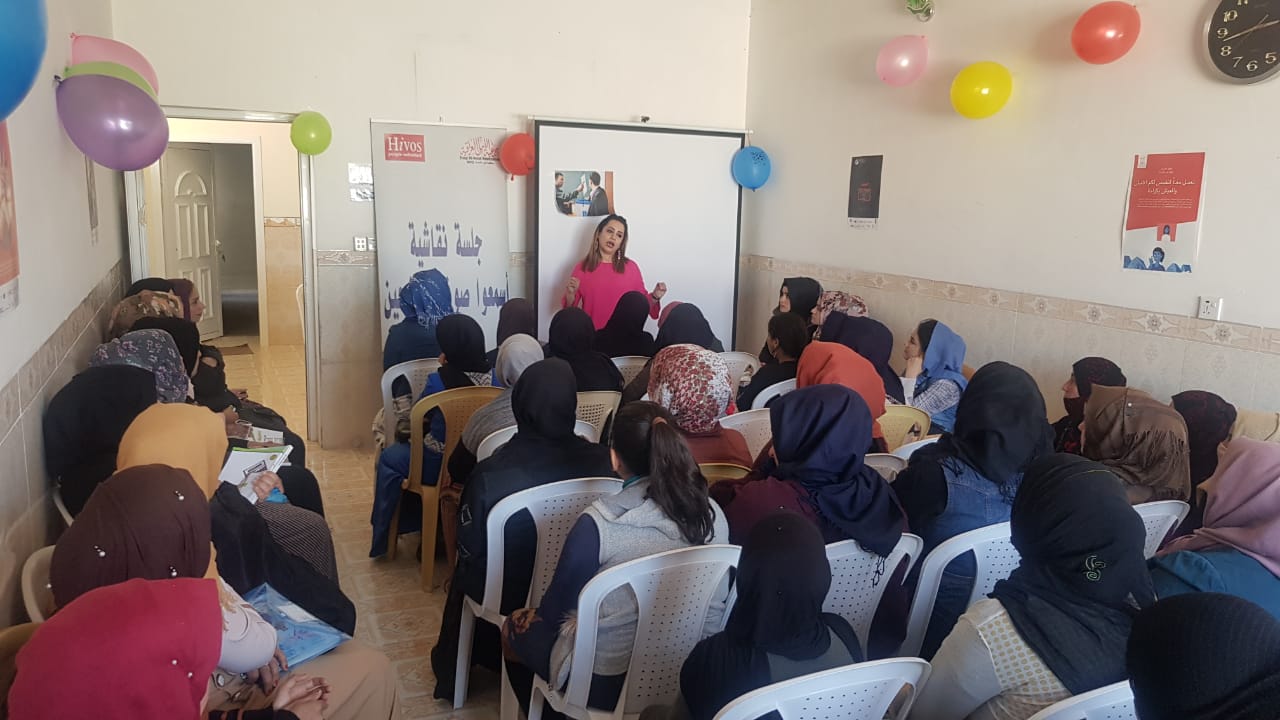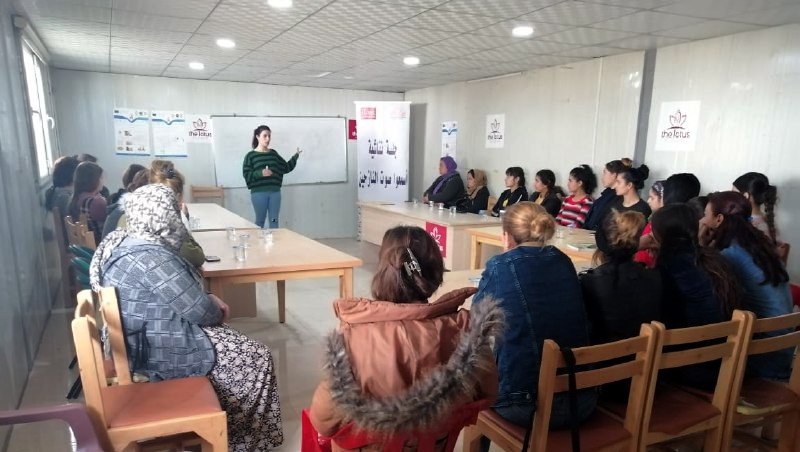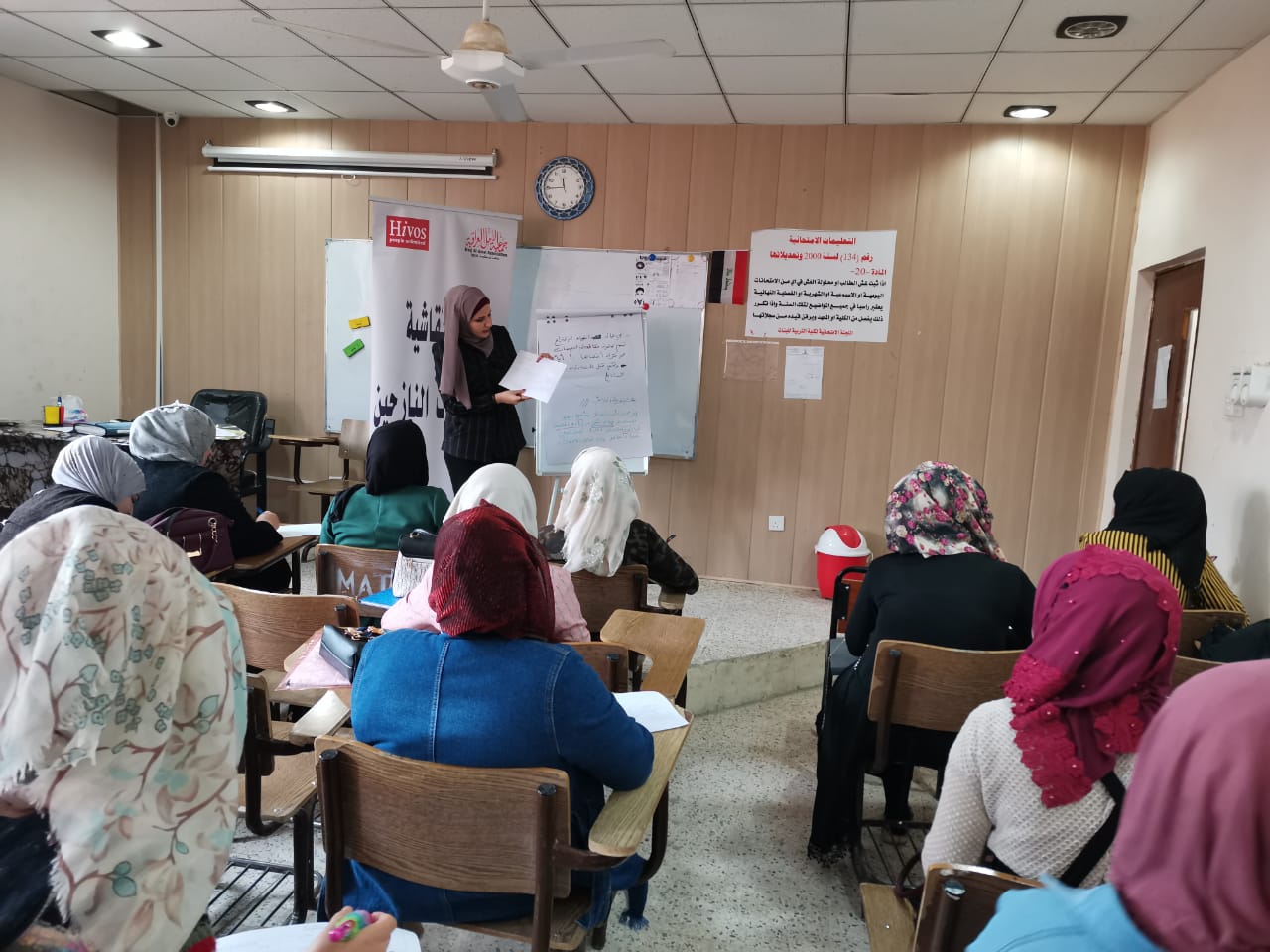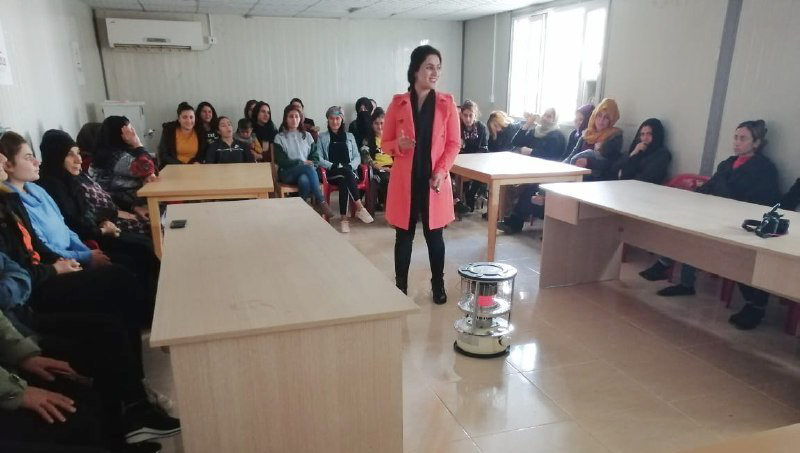Three Iraqi women plan to carry out long-term changes from the root, Haba, Nasima and Marwa now think of elections differently: they are informed about elections, and when they visit the camps, they are well equipped with skills to mobilize the Internally Displaced Persons (IDPs) to exercise their electoral rights and make their voices heard.
The three women, from different Iraqi provinces, participated in the training sessions of a program, called Giving Voices to the IDP and by implemented al-Amal Association, aiming at supporting equitable representation and enhanced engagement of IDPs, in particular women and minorities, in the national and provincial elections.
The training sessions, which were part of a 24-month program backed by Hivos Organization, have taken place in seven provinces where IDPs from different minorities are present: Duhok, Sulaymania, Erbil, Nineveh, Baghdad, Najaf and Kirkuk.
The 24-month long project resulted from the mass displacement of one million and 300 thousand Iraqi citizens due to the surge of violence between the armed groups and the government forces, leaving them with a difficult financial situation and no options to deliver their unheard voices. Consequently, the program was designed to deliver their voices and protect their rights.
Attendees of a training session of Giving Voice to the IDPs, 2018. Photo: al-Amal Association
Al-Amal Association held 361 training sessions throughout the program, with the help of volunteers, that benefitted thousands of people.
From marginalization to leadership
“I wanted women to no longer become victims and to make decisions on their own. That is why I learned all the lessons and was able to teach people on how to exercise their rights,” Haba Raad Abdullah, 32, said.
Haba is a university graduate and has been working in various organizations for several years. Before her participation in the training sessions of al-Amal Association, she had insufficient information on elections and the role of women. “I just casted my vote, but after the sessions I learned significantly on the electoral laws and process as well as the role of women in the elections.”
After the sessions I learned significantly on the electoral laws and process as well as the role of women in the elections
Al-Amal Association is a civil society organization founded in 1993 in the Kurdistan Region but later expanded its work across Iraq.
“Now, I know how importance the role of women is, from nomination as a candidate to parliament. They can run in the elections like men, I am aware of the laws and the requirements and I help women to exercise their electoral law.”
I am aware of the laws and the requirements and I help women to exercise their electoral law
Haba told KirkukNow that an old woman asked her what election card is used for in one of the sessions she held for the IDPs because they were neither aware of their electoral rights, nor were they were of why they need to vote. “The woman said that every election her husband takes her election card and that she is not aware such the process.”
Haba has motivated the IDPs to participate in the elections in order to prevent other casting votes on behalf of them and to elect their representatives whom they think are qualified, also explaining the differences between the provincial and the federal parliamentary elections.

Haba holds a session focus on the importance of their participation in the elections. Photo: Al-Amal Association
“Their demands are basic: compensations, salaries distribution, and service delivery. I have delivered my experience to them as much as I have been able, showing them how to raise their concerns and deliver their voices to the authorities through the ballots,”
One of the objectives of the program led by Hivos is increasing awareness level of the IDPs on elections through spreading general information and educational campaign, aiming at inclusive government, social cohesion and coexistence.
Right Restoration
Nasima Shammo, after her participation in the program, learned that the women’s quota system exists and that many women have been deprived of such a right or have not exercised it in the past.
“Before the course of Al-Amal Association on elections, I did not know what women’s quota system is and how it works. I received significant information on the political party’s laws as well as political process. I thought any one can establish a party, but later learned that there is laws and specific requirements,” Shammo said.
I did not know what women’s quota system is and how it works
Shammo, 22, is a displaced woman in Duhok and studied from an institute for two years. She explained that the main reasons for her participation in the program was to get familiar with how life outside of the camps looks like, gaining information on election and politics in order to pass her knowledge to the other IDPs.
“Learning at the camps is important to us in order to think of our rights and not waste our votes. We should think of changes thorough elections,” Shammo told KirkukNow.
We should think of changes thorough elections
She added that the votes of the IDPs shall not be seen for the sake of elections, but rather it should be aimed at making changes, electing qualified persons as well as not voting based on ethnicity or religion.
Another objective of the Hivos’s program is to empower the IDPs, in particular the women and the minorities, to increase their personal developments and confidence to take leadership role in society and politics.

Nasima Shammo is giving a session on election. Photo: Nasima Shammo to KirkukNow
She said that, “we gained significant knowledge on gender relations, women rights, the distribution of votes, and the electoral seats,” adding that she has encouraged people to vote based on merits and qualification, not voting to a candidate who is from his family or tribe.
A vote for democracy
Even though Marwa Alusif believes Iraq’s democracy and elections awareness have not developed sufficiently, she has become optimistic after receiving detailed information on both subjects.
“I participated in the program for numerous reasons such as gaining knowledge on elections because elections still appear new for our people and we do not have adequate experience with it.”
Alusif, 28, has a master degree and occasionally volunteers with different humanitarian organizations. She said she greatly benefited from the sessions, gaining knowledge on the electoral laws, which have changed her perception of elections.
“I casted my vote in every election. We should all try to make changes through our votes, especially due to the current political landscape. I learned how I and the other IDPs can strive to elect qualified representatives. Perhaps, changes may take years, but it is important to remain hopeful.”
The involvement of women in politics and elections is not at the necessary level
She believes that, “the involvement of women in politics and elections is not at the necessary level… the reason is that women do not have confidence in their roles and abilities as well as because of the complicated political and difficult financial situation,” she said, adding that her participation in the training sessions helped her overcome such challenges.
“I learned what the laws are and what laws are not implemented… I am now more aware of the political landscape.”

Marwa Alusif is giving a session to the IDPs, showing how important it is to deliver their voices through the ballots. Photo: Al-Amal Association
Through the program, Hivos Organization attempted to ease tensions among the local communities, prevent violence, and improving social cohesion between the IDPs and the host communities, including the religious and ethnic groups.
Alusif believes that the demands of the IDPs can be addressed easily, as they want to return to their hometown and receive compensations, which can be achieved through electing qualified representatives.
“I delivered what I learned from the program to the IDPs and told them: look how the young people at the protest squares have exerted influence to make changes. I encouraged the IDPs not to give up on their electoral rights, with which they can strengthen democracy and prevent fraud. The destination is not close and it might take years to reach it, but eventually we, together, can deliver our voices better.”
look how the young people at the protest squares have exerted influence to make changes
Hivos believes the lack of leadership skills among the IDPs, especially the women and the minorities, is one of the primary reasons for the absence of IDP candidates in the elections, adding that a stable political situation are achieved through a free and fair election, which paves the way for tolerance and the guarantee of the electoral rights of the IDPs.





